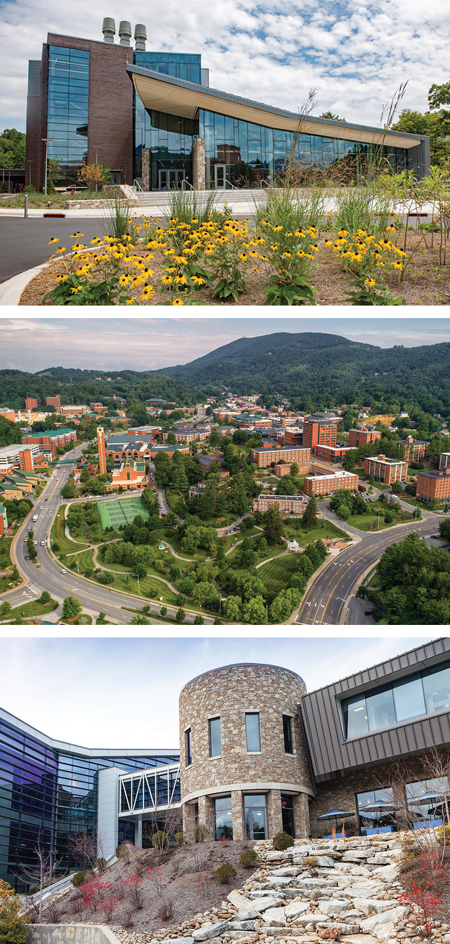Focus: Western region, westward wow
Western North Carolina’s economy thrives with national companies,
homegrown businesses and tourism.
By Katherine Snow Smith and Kathy Blake
Western North Carolina, known for natural wonders as well as one of the most recognized man-made structures in the country, offers numerous dichotomies.
It’s historic and hip. The 129-year-old Biltmore House draws more than 1 million visitors annually. Food & Wine magazine ranks Asheville second in the country for the number of craft breweries. The western end of the state draws both the young and old. Retirees flock to N.C. mountain towns from across the country while students are drawn to the regions’ 20-plus colleges.
It’s relaxing and active. Fresh mountain air and gorgeous views mix with whitewater rapids, woodsy trails and snow-covered ski runs to get people of all ages moving. Big businesses and entrepreneurs keep the region growing.
“When talking about economic development, my mind goes to two extremes,” says Clark Duncan, senior vice president of economic development at Asheville’s Chamber of Commerce. “This current fiscal year, we just had the ribbon cutting of the Pratt & Whitney turbine airfoil manufacturing plant, the largest investment west of Charlotte, at $650 million and 800 new jobs. That’s a scale of project we aren’t used to winning out here in the west.”
Pratt & Whitney wages will average $68,500 annually, higher than the county average of $40,000.
On the other extreme is the success of startups.
“Venture Asheville [an entrepreneurship initiative] is an intentional effort started about 10 years ago to diversify our strategy and grow our own. Call it economic gardening,” he says. “That 10-year trajectory has passed really significant milestones.”
The area’s startups have collectively taken in more than $100 million in revenue in a decade.
“The common thread is it’s a region that champions economic development. It has a common goal, a shared goal across the region, across the communities and a lot of teamwork to make things happen,” Duncan says, “For the west, it really is about attracting the next generation and the technological state of our workforce. Our automotive and aerospace sectors and our entrepreneurship really speak to our innovation.”

Breweries like Innovation Brewery in Sylva bring crowds year round.
BIG FISH
While tourists and locals swap stories of largemouth bass caught in the French Broad River, economic development folks and job seekers consider the region’s national employers as the big catches.
■ Pratt & Whitney is a subsidiary of Connecticut-based RTX Corporation. It chose Asheville for a 1-million-square-foot plant to manufacture airplane fan blades. The facility is on a 100-acre site Biltmore Farms sold to Pratt & Whitney for $1. Biltmore Farms has 900 acres next to the
property that could become home to more companies.
■ GE Aviation, which also makes high tech fan blades for jet engines, opened a $126 million plant in 2014 to produce an aircraft engine material called ceramic matrix composite. Five years later it invested $105 million more in an expanded facility, increased technology and added jobs. It employs 550 in Asheville and close to 300 at West Jefferson in nearby Ashe County.
■ BorgWarner Turbo Systems in Arden makes the turbocharging technology for a wide range of vehicles including IndyCar Series cars that race at more than 200 mph. Since 1977, employment at the western N.C. facility has grown to more than 600 employees. In 2021, Michigan-based BorgWarner invested $62 million in its Arden plant.
Though it takes a lot of small breweries to make western North Carolina a mecca for craft beer enthusiasts, two national companies employ high numbers.
Sierra Nevada Brewing started in California in 1980 and expanded to Mills River in Henderson County in 2015. Along with creating jobs and drawing visitors, Sierra Nevada has been a leader in sustainability. In 2016, Sierra Nevada Brewing achieved platinum certification for Leadership in Energy and Environmental Design.
More recently, it worked with American Recycling of Western North Carolina to develop a joint plastics and cardboard recycling center for about 20 breweries and other businesses.
New Belgium Brewing is a national brand that opened an Asheville brewery in 2016. The Colorado-based company is also a leader in clean energy and sustainability. Its 18-acre facility on the French Broad River includes tables, chairs and bars made from repurposed wood.
The Asheville-Metro Breweries Industry experienced a 357% increase in jobs from 2014 to 2019, the largest percentage increase among manufacturers in the Asheville area. In 2019, the industry had a $935 million economic impact. Its 3,471 jobs pay an average annual salary of
$51,844, according to research done for the Economic Development Council.
Western North Carolina’s economy also has two distinctive employers unlike any elsewhere in the state. The 8,000-acre Biltmore Estate employs more than 2,000 people at the home and grounds. Visitors drop jaws at the 250 rooms, which include 35 bedrooms, 43 bathrooms, 65 fireplaces, an indoor pool and a banquet table with seating for 64.
Harrah’s Cherokee Casino Resort, owned by the Eastern Band of Cherokee Indians, accounts for 7,000 jobs, according to the Eastern Band. The complex includes two casinos managed by Caesars Entertainment, four hotel towers with 1,800 rooms, restaurants and retail.
HOMEGROWN SUCCESS
Small businesses also play a vital role in the economic ecosystem. Venture Asheville is an initiative by the Economic Development Coalition for Asheville-Buncombe County and the Asheville Chamber of Commerce. Its Elevate program pairs founders and executives with entrepreneurs. It also offers experts in human resources, patents, finance and branding.
“In the world of entrepreneurship, success often hinges on the ability to navigate complex and rapidly changing environments,” says director Jeff Kaplan. “At Elevate, we believe mentorship, experiential learning and competency assessments are essential tools for founders seeking to build resilient and sustainable businesses.”
Poppy Handcrafted Popcorn is an example of a company that benefited from Venture Asheville’s Elevate incubator. Founder Ginger Frank started Poppy in 2014. She now employs 45, has more than 30 flavors, and her Parmesan & Black Pepper variety topped all bagged popcorns by Tasting Table, a website for food and
beverage connoisseurs.
“Venture Asheville came along at a very pivotal point in the Poppy journey,” Frank says. “They offered advice, helped me carve out direction, provided connections to financial resources, helped me solve problems, even showed up at times to help fix machinery or fill orders.”
Last year, Frank announced a $4.3 million investment to double Poppy’s manufacturing space with 45,000-square-feet of new production facilities and the creation of 66 jobs in the next five years. Wages will be $26.40 per hour.
David and Christina Ackely’s entrepreneurial journey also was guided by Venture Asheville and Elevate. While living in Panama they discovered how to make ginger beer, and started showcasing their product at homebrew festivals. In 2015, the couple incorporated their beverage and opened Ginger’s Revenge in 2017. It now employs 23, is brewed in batches of 472 gallons and is distributed to more than 650 lo

Western Carolina University, Appalachian State University, and
UNC Asheville are UNC System institutions.
BUSINESS & COLLEGE COLLABORATION
Private and public colleges in western North Carolina work closely with employers to help students excel in the workforce. Asheville-Buncombe Technical Community College’s Manufacturing Center offered a free Pratt & Whitney Fast Track training program to put residents into aerospace manufacturing jobs.
“We have been preparing for this important step for several years through new equipment acquisitions, adding key staff members, and developing training curricula,” A-B Tech’s director of economic and workforce development Kevin Kimrey said in a release. The Appalachian Regional Commission awarded the college two $1.5 million grants for technical equipment purchases for specialized
Pratt & Whitney training. The commission exists to strengthen economic growth in 423 counties in 13 states across Appalachia.
Another example of education meeting changing needs of students and the workplace is under construction 85 miles away at Appalachian State University in Boone. The school broke ground last year on its Conservatory for Biodiversity Education and Research, the first academic building in its Innovation District.
“As the Innovation District develops, it
will provide a thriving space where students, faculty and staff work together with industry partners in specialized areas that capitalize
on Appalachian State’s strengths and
regional identity. Collaborations across colleges and disciplines will prepare students for career progression in a dynamic work environment,” said Appalachian State Chancellor Sheri Everts in a press release. The conservatory
is slated to open next fall.
The 50,000-square-foot building will be among the nation’s first academic research facilities built to the sustainability standards of the Living Building Challenge, according to Nick Katers, vice chancellor of facilities management at ASU. The building must generate more energy than it uses and be made of materials that are healthy for the environment.
AIRPORT EXPANSION
Twelve miles from downtown, Asheville Regional Airport is growing to serve the metro area’s 450,000 residents. The N.C. Local Government Commission approved the airport authority’s recent request for $175 million in transportation revenue bonds, making way for its terminal expansion.
The airport serves six airlines: Allegiant, American, Delta, JetBlue, Sun Country and United. With 25 domestic and international destinations, it’s the third-busiest airport in North Carolina, according to a release from the N.C. Department of State Treasurer. Asheville Regional served 1.8 million passengers in 2022.
THE MOUNTAINS ARE CALLING
Along with natural wonders, themed hotels and local food are tourism lures. Buncombe County’s mountains, abundance of arts galleries, varied culinary experiences, music scene and historical buildings are tourism magnets. The N.C. Department of Commerce reports Buncombe ranked second in N.C. traveler expenditures in 2021, with visitors dropping $2.6 billion. (Mecklenburg County ranked first.)
Cass Herrington with Explore Asheville says a trend for 2023 is to promote group travel experiences and places for parties to stay that “foster meaningful connections and integrate wellness into their corporate and event travel itineraries.”
“Asheville is known as one of the most colorful fall destinations in the nation, and one of the longest leaf seasons in the world due to the biodiversity combined with staggered color change at different mountain elevations,” she says. “This is a great time to take in the scenes with trail running, hiking, mountain biking and forest bathing.”
Theme hotels such as The Flat Iron (Prohibition-themes, with hidden speakeasy), The Radical (also with speakeasy) and Zelda Dearest (as in novelist Zelda Fitzgerald, wife of F. Scott Fitzgerald) are popular stays for group experiences. Wrong Way Cabins & Campground, which opened in 2022 with 16 tiny A-frame cabins near the French Broad River, is another addition to the lodging mix.
“It’s one of the few rivers in the world that flows north, thus inspiring the ‘wrong way’ moniker,’ ” Herrington says. “The riverside accommodation is a first-of-its-kind lodging option that combines the casual nostalgia of a campground with hotel conveniences.”
Destinations for animal enthusiasts include Mountain Horse Farm, Montgomery Sky Farm and Dr. King’s Farms.
With 2023 being North Carolina’s “Year of the Trail,” Buncombe is touting its proximity to national and state parks. Outdoor tour company Asheville Wellness Tours has several guided experiences for groups.
Foodies have continued reasons to treat their palates in Asheville. The area offers popular farm tours, farm-to-table restaurants and the NC Green Travel Initiative, which “recognizes North Carolina restaurants (and other businesses) who go above and beyond to reduce their carbon “forkprint.” The WNC Cheese Trail pairs western North Carolina cheeses with wineries as well as the Blue Ridge Mountain Creamery and Round Mountain Creamery.
“Asheville during the fall season is more than colorful leaves and stunning mountain vistas,” Herrington says. “Shaped and nurtured by nature, Asheville speaks to the growing number of travelers seeking to authentically connect with the natural world and the local community.” ■

